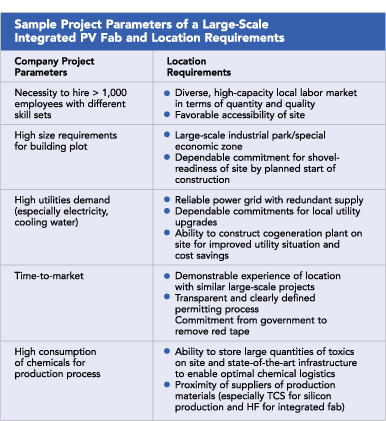Solar Industry's Bright Future
The solar industry has evolved into one of the key investment fields worldwide, and market forecasts continue to project double-digit growth for the coming years.
June/July 09

The production of solar photovoltaic (PV) modules and components is now an industry with an annual market volume of more than $20 billion (2008). Manufacturing is no longer dominated by small start-ups and university spin-offs. Instead industry leaders with global standing, such as Q-Cells, REC, or First Solar have emerged. Additionally, established large corporations like GE, Sharp, and Intel are increasingly active in the field or have recently entered into this highly attractive business.
Given the strong medium- and long-term fundamentals of the solar industry, companies will continue to expand their capacities, invest in new production sites, and establish a truly global footprint. This results in excellent prospects for individual regions to position themselves as manufacturing locations of choice.
Leading companies have started to establish manufacturing locations in each of the three current main regions - America, Asia-Pacific, and Europe - to fully cover the global market and optimize their cost structure as the industry becomes more and more competitive.
Challenges for PV Manufacturers
PV manufacturers are currently faced with an increasing geographical diversification of their industry: Dependency on a small number of (heavily subsidized) core markets is decreasing, and market growth is taking place on an ever-wider scale. This means companies will have to choose their locations in a geographically fragmented market, with many centers of growth in almost all parts of the world.
Like sales markets, companies themselves are also changing. Founder-managed companies are turning into medium-sized enterprises, and established market participants are going public. This naturally influences the decision-making process and the formulation of corporate strategy. In addition, the scale of investment projects in photovoltaics is also constantly increasing. Whereas, until recently, the manufacturing process was fragmented into the various steps in the value chain (silicon, wafers, cells, modules), and corresponding investment amounts for each individual project were relatively small, the industry is quickly turning to a more and more integrated production process, with larger volumes and projects now easily reaching several hundred millions of dollars in investment and the creation of at least a few hundred jobs.
Project Announcements
Wyandot Snacks Expands Marion, Ohio, Production Operations
08/29/2025
Trane Technologies Expands Fort Smith, Arkansas, Operations
08/29/2025
BioMADE Plans Boone, Iowa, Bioindustrial Manufacturing Operations
08/29/2025
Choice Fabricators Expands Rainbow City, Alabama, Production Operations
08/29/2025
Ranovus Expands Ottawa, Ontario, Semiconductor Operations
08/29/2025
Belgium-Based Stow Group Plans Gordon County, Georgia, Manufacturing Operations
08/28/2025
Most Read
-
Tariffs, Talent, and U.S. Expansion
Q3 2025
-
What We’re Getting Wrong About Gen Z’s Future in the Skilled Trades
Q3 2025
-
Data Center Demand Stabilizes Amid Changing Market Forces
Q3 2025
-
A New Course for U.S. Shipbuilding
Q3 2025
-
Optimizing Your Rail-Served Transportation Network: Strategy Before Steel
Q2 2025
-
In Focus: AI Is Changing Incentives Math
Q2 2025
-
Rewriting the Rules of Warehouse ROI
Q3 2025